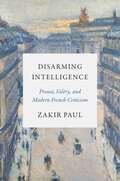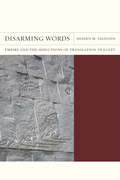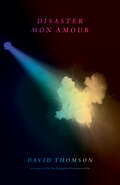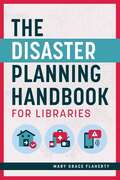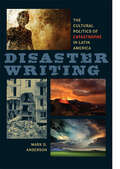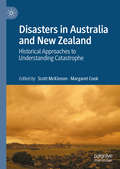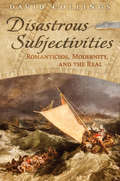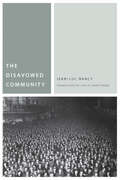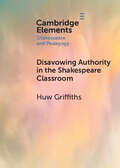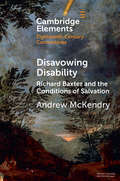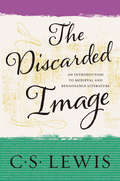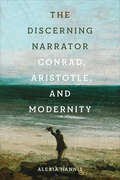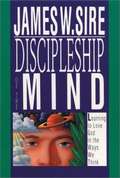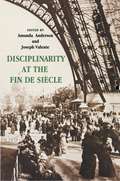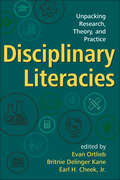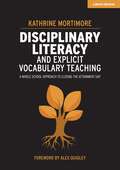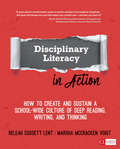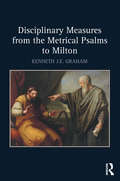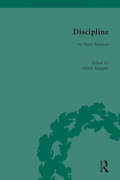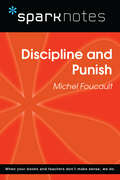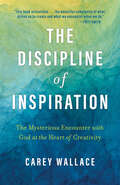- Table View
- List View
Disarming Intelligence: Proust, Valéry, and Modern French Criticism
by Zakir PaulA critical account of the idea of intelligence in modern French literature and thoughtIn the late nineteenth century, psychologists and philosophers became intensely interested in the possibility of quantifying, measuring, and evaluating &“intelligence,&” and using it to separate and compare individuals. Disarming Intelligence analyzes how this polyvalent term was consolidated and contested in competing discourses, from fin de siècle psychology and philosophy to literature, criticism, and cultural polemics around the First World War.Zakir Paul examines how Marcel Proust, Henri Bergson, Paul Valéry, and the critics of the influential Nouvelle revue française registered, negotiated, and subtly countered the ways intelligence was invoked across the political and aesthetic spectrum. For these writers, intelligence fluctuates between an individual, sovereign faculty for analyzing the world and something collective, accidental, and contingent. Disarming Intelligence shows how literary and critical styles questioned, suspended, and reimagined what intelligence could be by bringing elements of uncertainty and potentiality into its horizon. The book also explores interwar political tensions—from the extreme right to Walter Benjamin&’s engaged essays on contemporary French writers. Finally, a brief coda recasts current debates about artificial intelligence by comparing them to these earlier crises of intelligence.By drawing together and untangling competing conceptions of intelligence, Disarming Intelligence exposes its mercurial but influential and urgent role in literary and cultural politics.
Disarming Words
by Shaden M. TageldinIn a book that radically challenges conventional understandings of the dynamics of cultural imperialism, Shaden M. Tageldin unravels the complex relationship between translation and seduction in the colonial context. She examines the afterlives of two occupations of Egypt--by the French in 1798 and by the British in 1882--in a rich comparative analysis of acts, fictions, and theories that translated the European into the Egyptian, the Arab, or the Muslim. Tageldin finds that the encounter with European Orientalism often invited colonized Egyptians to imagine themselves "equal" to or even "masters" of their colonizers, and thus, paradoxically, to translate themselves toward--virtually into--the European. Moving beyond the domination/resistance binary that continues to govern understandings of colonial history, Tageldin redefines cultural imperialism as a politics of translational seduction, a politics that lures the colonized to seek power through empire rather than against it, thereby repressing its inherent inequalities. She considers, among others, the interplays of Napoleon and Hasan al-'Attar; Rifa'a al-Tahtawi, Silvestre de Sacy, and Joseph Agoub; Cromer, 'Ali Mubarak, Muhammad al-Siba'i, and Thomas Carlyle; Ibrahim 'Abd al-Qadir al-Mazini, Muhammad Husayn Haykal, and Ahmad Hasan al-Zayyat; and Salama Musa, G. Elliot Smith, Naguib Mahfouz, and Lawrence Durrell. In conversation with new work on translation, comparative literature, imperialism, and nationalism, Tageldin engages postcolonial and poststructuralist theorists from Frantz Fanon, Edward Said, and Gayatri Spivak to Jean Baudrillard, Walter Benjamin, Emile Benveniste, and Jacques Derrida.
Disaster Drawn: Visual Witness, Comics, and Documentary Form
by Hillary L. ChuteIn hard-hitting accounts of Auschwitz, Bosnia, Palestine, and Hiroshima's Ground Zero, comics have shown a stunning capacity to bear witness to trauma. Hillary Chute explores the ways graphic narratives by diverse artists, including Jacques Callot, Francisco Goya, Keiji Nakazawa, Art Spiegelman, and Joe Sacco, document the disasters of war.
Disaster Mon Amour
by David ThomsonA deep—and darkly comic—dive into the nature of disasters, and the ways they shape how we think about ourselves in the world &“In this brilliant book, David Thomson tells the story of how we came to make disaster and catastrophe our best friends—how we let terror cocoon and take over our imaginations to avoid seeing the things that really frighten us. Riveting and totally original.&”—Adam Curtis, BBC filmmaker and political journalist &“Erudite. . . . Engaging. . . . A cri de coeur about art&’s struggle to keep up with reality.&”—Kirkus Reviews Audiences swell with the scale of disaster; humans have always been drawn to the rumors of our own demise. In this searching treatment, noted film historian David Thomson examines iconic disasters, both real and fictional, exposing the slippage between what occurs and what we observe. With reportage, film commentary, speculation, and a liberating sense of humor, Thomson shows how digital culture commodifies disaster and sates our desire to witness chaos while suffering none of its aftereffects. Ranging from Laurel and Hardy and Battleship Potemkin to Cormac McCarthy&’s The Road, and from the epic San Andreas to the intimate Don&’t Look Now, Thomson pulls back the curtain to reveal why we love watching disaster unfold—but only if it happens to others.
The Disaster Planning Handbook For Libraries
by Mary Grace FlahertyLibraries are in a unique position to aid communities during times of adversity, and this comprehensive handbook’s practical tools and expert guidance will help ensure that your library is thoroughly prepared for emergency response and recovery. Your library is a vital information hub and resource provider every single day, and that’s doubly true when calamity strikes. In fact, your library’s role as an “essential community function” during disasters is now encoded in U.S. law. Engaging as a partner in planning and preparedness will build much-needed community support should disaster strike, and even a basic plan will also save you time and stress later on. No matter where your library is in the disaster planning cycle, this handbook will make the process clearer and less daunting. You’ll get tools, activities, easy-to-adapt templates, and hands-on guidance on such topics as the six phases of disaster response; 15 first-hand accounts of library disaster planning or responses, helping you identify the library services most needed during a disaster; three essential factors that will shape the form of your disaster plan; preparing for hurricanes, tornadoes, fires, floods, and earthquakes; ideas for connecting with your community’s emergency response teams; federal government planning resources; pointers on working with state and local governments; a sample Memorandum of Understanding to outline mutual support for a speedier recovery; recommended courses and training, many of which are free; targeted advice for archives and special collections; sample building inspection checklists; and recommended games to help children and families prepare.
Disaster Writing: The Cultural Politics of Catastrophe in Latin America (New World Studies)
by Mark D. AndersonIn the aftermath of disaster, literary and other cultural representations of the event can play a role in the renegotiation of political power. In Disaster Writing, Mark D. Anderson analyzes four natural disasters in Latin America that acquired national significance and symbolism through literary mediation: the 1930 cyclone in the Dominican Republic, volcanic eruptions in Central America, the 1985 earthquake in Mexico City, and recurring drought in northeastern Brazil. Taking a comparative and interdisciplinary approach to the disaster narratives, Anderson explores concepts such as the social construction of risk, landscape as political and cultural geography, vulnerability as the convergence of natural hazard and social marginalization, and the cultural mediation of trauma and loss. He shows how the political and historical contexts suggest a systematic link between natural disaster and cultural politics.
Disasters: 21 Stories of Death and Destruction (Critical Reading Series)
by Henry Billings Melissa Billings Dan DramerThe high-interest, controlled readability Critical Reading Series contains fascinating nonfiction and exercises that build reading comprehension and critical thinking skills.
Disasters in Australia and New Zealand: Historical Approaches to Understanding Catastrophe
by Scott McKinnon Margaret CookDisasters in Australia and New Zealand brings together a collection of essays on the history of disasters in both countries. Leading experts provide a timely interrogation of long-held assumptions about the impacts of bushfires, floods, cyclones and earthquakes, exploring the blurred line between nature and culture, asking what are the anthropogenic causes of ‘natural’ disasters? How have disasters been remembered or forgotten? And how have societies over generations responded to or understood disaster? As climate change escalates disaster risk in Australia, New Zealand and around the world, these questions have assumed greater urgency. This unique collection poses a challenge to learn from past experiences and to implement behavioural and policy change. Rich in oral history and archival research, Disasters in Australia and New Zealand offers practical and illuminating insights that will appeal to historians and disaster scholars across multiple disciplines.
Disastrous Subjectivities: Romaniticism, Modernity, and the Real
by David CollingsIn sharply original readings of Mary Wollstonecraft, William Godwin, William Wordsworth, Lord Byron, and Percy Bysshe Shelley, Disastrous Subjectivities explores modernity's failed promise to bring about a just social order. Drawing on Kantian critical philosophy and Lacanian theory, this book traverses aspects of the history of science, the form of the novel, the limits of historicism, and the impasses of moral autonomy. What passes for modernity takes shape not as truly modern or secular, but as a mode perpetually haunted by a traumatic sublime. The demand to realize justice within history turns out to require more than history can make possible, and more than the subject can bear.
The Disavowed Community (Commonalities)
by Jean-Luc NancyOver thirty years after Maurice Blanchot writes The Unavowable Community (1983)—a book that offered a critical response to an early essay by Jean-Luc Nancy on “the inoperative community”—Nancy responds in turn with The Disavowed Community. Stemming from Jean-Christophe Bailly’s initial proposal to think community in terms of “number” or the “numerous,” and unfolding as a close reading of Blanchot’s text, Nancy’s new book addresses a range of themes and motifs that mark both his proximity to and distance from Blanchot’s thinking, from Bataille’s “community of lovers” to the relation between community, communitarianism, and being-in-common; to Marguerite Duras, to the Eucharist. A key rethinking of politics and the political, this exchange opens up a new understanding of community played out as a question of avowal.
Disavowing Authority in the Shakespeare Classroom (Elements in Shakespeare and Pedagogy)
by Huw GriffithsBased on real experiences of teaching Shakespeare in diverse classrooms and outreach programmes, this Element questions the role of authority in Shakespeare teaching. It connects an understanding of how Shakespearean texts function with critical thinking about teaching, especially derived from the work of Jaques Rancière. Certain elements of the Shakespearean text - notably how it was intended to teach its first readers, the actors, and its uses of dramatic irony - are revealed as already containing possibilities for more decentred forms of knowledge production.
Disavowing Disability: Richard Baxter and the Conditions of Salvation (Elements in Eighteenth-Century Connections)
by Andrew McKendryDisavowing Disability examines the role that disability, both as a concept and an experience, played in seventeenth-century debates about salvation and religious practice. Exploring how the use and definition of the term 'disability' functioned to allocate agency and culpability, this study argues that the post-Restoration imperative to capacitate 'all men'—not just the 'elect'—entailed a conceptual circumscription of disability, one premised on a normative imputation of capability. The work of Richard Baxter, sometimes considered a harbinger of 'modernity' and one of the most influential divines of the Long Eighteenth Century, elucidates this multifarious process of enabling. In constructing an ideology of ability that imposed moral self-determination, Baxter encountered a germinal form of the 'problem' of disability in liberal theory. While a strategy of 'inclusionism' served to assimilate most manifestations of alterity, melancholy presented an intractability that frustrated the logic of rehabilitation in fatal ways. This title is also available as Open Access on Cambridge Core.
The Discarded Image: An Introduction to Medieval and Renaissance Literature
by C. S. LewisIn The Discarded Image, C.S. Lewis paints a lucid picture of the medieval world view, providing the historical and cultural background to the literature of the Middle Ages and Renaissance. It describes the "image" discarded by later years as "the medieval synthesis itself, the whole organization of their theology, science and history into a single, complex, harmonious mental model of the universe." This, Lewis's last book, has been hailed as "the final memorial to the work of a great scholar and teacher and a wise and noble mind."
The Discerning Narrator: Conrad, Aristotle, and Modernity
by Alexia HannisThe Discerning Narrator sheds new light on Joseph Conrad’s controversial critique of modernity and modernization by reading his work through an Aristotelian lens. The book proposes that we need Aristotle – a key figure in Conrad’s education – to recognize the profound significance of Conrad’s artistic vision. Offering Aristotelian analyses of Conrad’s letters, essays, and four works of fiction, Alexia Hannis illuminates the philosophical roots and literary implications of Conrad’s critique of modernity. Hannis turns to Aristotle’s ethical formulations to trace what she calls "the discerning narrator" in Conrad’s oeuvre: a compassionate yet sceptical guide to appraising character and conduct. The book engages with past and current Conrad scholarship while drawing from Aristotle’s Poetics, Politics, and Nicomachean Ethics to offer original philosophical analyses of Conrad’s works. Drawing on Aristotle, Hannis provides a fresh context for making sense of Conrad’s self-differentiation from modernity. As a result, The Discerning Narrator provides an affirmation of literature’s invitation to wonder about the possibilities inherent in human nature, including the potential for painful depravity, heroic excellence, and ordinary human happiness.
Discipleship of the Mind: Learning to Love God in the Ways We Think
by James W. SireChristians who are serious about their faith want to love God with all that they are -- heart and mind and strength. Books abound on the devotional life, on commitment, on evangelism and practical Christian living, but few take up what it means to love God with our minds. How do we learn to honor God in the ways we think? James Sire blazes a trail for Christians concerned about the discipleship of our minds. After looking at the attitudes toward God and ourselves necessary for the journey, he introduces us to the basics of the Christian world view. Separate chapters discuss the foundations of knowledge and the relationship between knowing and doing. With an eye to the practical, Sire offers specific suggestions on getting to know what is good and getting to know the world. He also provides valuable insights on how Christians might approach various academic disciplines as disciples of Christ. Here is a book for all who desire to love God with their minds.
Disciplinarity at the Fin de Siècle
by Amanda Anderson & Joseph ValenteContemporary celebrations of interdisciplinary scholarship in the humanities and social sciences often harbor a distrust of traditional disciplines, which are seen as at best narrow and unimaginative, and at worst complicit in larger forms of power and policing. Disciplinarity at the Fin de Siècle questions these assumptions by examining, for the first time, in so sustained a manner, the rise of a select number of academic disciplines in a historical perspective. This collection of twelve essays focuses on the late Victorian era in Great Britain but also on Germany, France, and America in the same formative period. The contributors--James Buzard, Lauren M. E. Goodlad, Liah Greenfeld, John Guillory, Simon Joyce, Henrika Kuklick, Christopher Lane, Jeff Nunokawa, Arkady Plotnitsky, Ivan Strenski, Athena Vrettos, and Gauri Viswanathan--examine the genealogy of various fields including English, sociology, economics, psychology, and quantum physics. Together with the editors' cogent introduction, they challenge the story of disciplinary formation as solely one of consolidation, constraint, and ideological justification. Addressing a broad range of issues--disciplinary formations, disciplinarity and professionalism, disciplines of the self, discipline and the state, and current disciplinary debates--the book aims to dislodge what the editors call the "comfortable pessimism" that too readily assimilates disciplines to techniques of management or control. It advances considerably the effort to more fully comprehend the complex legacy of the human sciences.
Disciplinary Literacies: Unpacking Research, Theory, and Practice
by Evan Ortlieb Britnie Delinger Kane Earl H. CheekEducators increasingly recognize the importance of disciplinary literacy for student success, beginning as early as the primary grades. This cutting-edge volume examines ways to help K–12 students develop the literacy skills and inquiry practices needed for high-level work in different academic domains. Chapters interweave research, theory, and practical applications for teaching literature, mathematics, science, and social studies, as well as subjects outside the standard core--physical education, visual and performing arts, and computer science. Essential topics include use of multimodal and digital texts, culturally responsive and sustaining pedagogy, and new directions for teacher professional development. The book features vivid classroom examples and samples of student work.
Disciplinary Literacy and Explicit Vocabulary Teaching: A Whole School Approach To Closing The Attainment Gap
by Kathrine MortimoreFirmly rooted in research evidence of what works within the classroom for our most disadvantaged students, Disciplinary Literacy and Explicit Vocabulary Teaching offers teachers and school leaders practical ways in which those students who are behind in their literacy capabilities can make excellent progress. Building on the work of Geoff Barton in his influential book Don’t Call it Literacy, Kathrine Mortimore outlines the unique literacy challenges posed by specific subject areas for those with weaker literacy skills, and more importantly how these challenges can be addressed and overcome.A student’s GCSE results are vital in giving them the choices they deserve in order to go on to the next stage of their academic careers. This book draws on the success stories of schools and subjects that have made significant improvements in the outcomes of the children they teach, regardless of their starting points. From the inevitable success of Michaela Community school, to the gains made by the English department at Torquay Academy and the rapid reading improvements at Henley Bank, this book draws on both whole school initiatives and subject-specific strategies which have had proven success. This book places a wide and balanced knowledge-rich curriculum at the centre of any school improvement strategy designed to improve literacy, and illustrates the role that all subjects must combine to play in building the vital background knowledge and vocabulary that young people need in order to read independently. This curriculum must then be delivered using those teaching methods that have had the greatest impact on disadvantaged learners, and this book sets out how the methodology of direct and explicit instruction can be adopted within each subject area. Alongside this is a useful summary of staff development and inset which offers practical ways in which teachers’ adoption of these effective strategies can be facilitated.There are also useful sections on creating a whole school dictionary of essential vocabulary, creating a culture of reading and writing, and also those key literacy barriers experienced by those students with some of the most common special educational needs.
Disciplinary Literacy and Explicit Vocabulary Teaching: A whole school approach to closing the attainment gap
by Kathrine MortimoreFirmly rooted in research evidence of what works within the classroom for our most disadvantaged students, Disciplinary Literacy and Explicit Vocabulary Teaching offers teachers and school leaders practical ways in which those students who are behind in their literacy capabilities can make excellent progress. Building on the work of Geoff Barton in his influential book Don’t Call it Literacy, Kathrine Mortimore outlines the unique literacy challenges posed by specific subject areas for those with weaker literacy skills, and more importantly how these challenges can be addressed and overcome.A student’s GCSE results are vital in giving them the choices they deserve in order to go on to the next stage of their academic careers. This book draws on the success stories of schools and subjects that have made significant improvements in the outcomes of the children they teach, regardless of their starting points. From the inevitable success of Michaela Community school, to the gains made by the English department at Torquay Academy and the rapid reading improvements at Henley Bank, this book draws on both whole school initiatives and subject-specific strategies which have had proven success. This book places a wide and balanced knowledge-rich curriculum at the centre of any school improvement strategy designed to improve literacy, and illustrates the role that all subjects must combine to play in building the vital background knowledge and vocabulary that young people need in order to read independently. This curriculum must then be delivered using those teaching methods that have had the greatest impact on disadvantaged learners, and this book sets out how the methodology of direct and explicit instruction can be adopted within each subject area. Alongside this is a useful summary of staff development and inset which offers practical ways in which teachers’ adoption of these effective strategies can be facilitated.There are also useful sections on creating a whole school dictionary of essential vocabulary, creating a culture of reading and writing, and also those key literacy barriers experienced by those students with some of the most common special educational needs.
Disciplinary Literacy in Action: How to Create and Sustain a School-Wide Culture of Deep Reading, Writing, and Thinking (Corwin Literacy)
by ReLeah Cossett Lent Marsha McCracken VoigtYou wouldn’t tell a heart surgeon to also do pediatrics—so why would we tell content area educators they must “do” literacy? Math, history, English and science teachers are passionate about their specialties, and that’s why authors Releah Lent and Marsha Voight designed a framework that keeps teachers’ subjects at the center of daily classroom life while also helping them pool strengths with colleagues. Based on years of successful implementation, this powerful PL cycle “drops in” seamlessly to any school setting, so teachers schoolwide take on innovative practices of reading, writing, thinking, and doing within their areas of expertise.
Disciplinary Literacy in Action: How to Create and Sustain a School-Wide Culture of Deep Reading, Writing, and Thinking (Corwin Literacy)
by ReLeah Cossett Lent Marsha McCracken VoigtYou wouldn’t tell a heart surgeon to also do pediatrics—so why would we tell content area educators they must “do” literacy? Math, history, English and science teachers are passionate about their specialties, and that’s why authors Releah Lent and Marsha Voight designed a framework that keeps teachers’ subjects at the center of daily classroom life while also helping them pool strengths with colleagues. Based on years of successful implementation, this powerful PL cycle “drops in” seamlessly to any school setting, so teachers schoolwide take on innovative practices of reading, writing, thinking, and doing within their areas of expertise.
Disciplinary Measures from the Metrical Psalms to Milton
by Kenneth J.E. GrahamDisciplinary Measures from the Metrical Psalms to Milton studies the relationship between English poetry and church discipline in four carefully chosen bodies of poetry written between the Reformation and the death of John Milton. Its primary goal is to fill a gap in the field of Protestant poetics, which has never produced a study focused on the way in which poetry participates in and reflects on the post-Reformation English Church's attempts to govern conduct. Its secondary goal is to revise the understandings of discipline which social theorists and historians have offered, and which literary critics have largely accepted. It argues that knowledge of the early modern culture of discipline illuminates some important poetic traditions and some major English poets, and it shows that this poetry in turn throws light on verbal and affective aspects of the disciplinary process that prove difficult to access through other sources, challenging assumptions about the means of social control, the structures of authority, and the practical implications of doctrinal change. More specifically, Disciplinary Measures argues that while poetry can help us to understand the oppressive potential of church discipline, it can also help us to recover a more positive sense of discipline as a spiritual cure.
Discipline: by Mary Brunton (Chawton House Library: Women's Novels)
by Mary Brunton Olivia MurphyDiscipline, the second novel by the Scottish writer Mary Brunton (1778-1818), was published in 1814. While less well known than its predecessor Self-Control (1811), it is nonetheless equally deserving of a central place in the canon of Romantic-era fiction. A wide-ranging novel, it shares many themes with contemporary fiction such as women’s difficulties in earning money and the horror of being falsely imprisoned in an insane asylum. However, it is Discipline’s innovative attempt at psychological realism that sets it apart from its contemporaries. Through the moral growth of its heroine Ellen Percy, Discipline insists on women’s self-determination, and their ability to become rational agents in a world that treats them as objects merely of desire or contempt. This edition is edited by Olivia Murphy who has added careful editorial notes and an insightful new introduction to the text.
Discipline and Punish (SparkNotes Philosophy Guide)
by SparkNotesDiscipline and Punish (SparkNotes Philosophy Guide) Making the reading experience fun! SparkNotes Philosophy Guides are one-stop guides to the great works of philosophy–masterpieces that stand at the foundations of Western thought. Inside each Philosophy Guide you&’ll find insightful overviews of great philosophical works of the Western world.
The Discipline of Inspiration: The Mysterious Encounter with God at the Heart of Creativity
by Carey WallaceLearn where inspiration comes from and how to harness it in your life and work. We all know the sensation of inspiration. It&’s what tells a painter what to paint and a singer how to sing—and what prompts us to throw a new spice into an old recipe. But what is inspiration? When we train artists, we typically identify them by their talent and train them in technique. We talk very little about the crucial creative spark of inspiration. Where does it come from? What does it want from us? How can we get more of it? In The Discipline of Inspiration, Carey Wallace meditates on this vital spark and on the ways artists have negotiated with it across genres and throughout history. She also offers practical methods—including silence, community, and rest—to help everyone access more inspiration, more often. Artists will develop a fresh perspective on inspiration and learn new tools for their creative practice. And readers from all walks of life will discover the transformative power of inspiration in every aspect of their lives.
